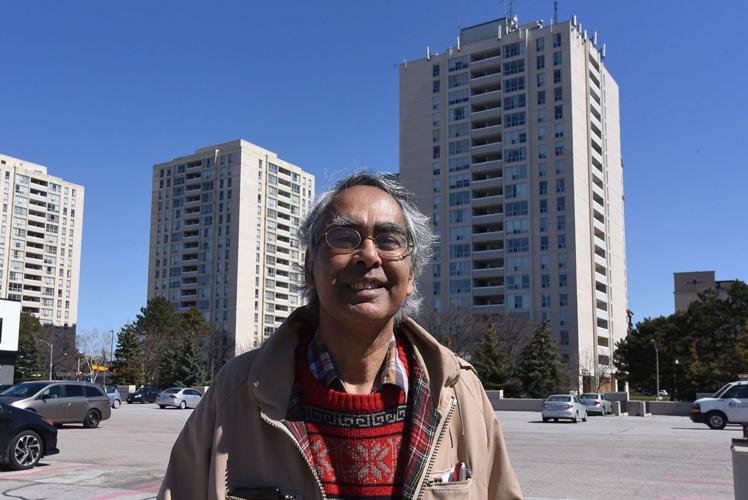Toronto.com: Not good news: Rent unit prices in GTA skyrocket amid historic inflation
Posted August 10, 2022
Posted on August 10, 2022
A developer is seeking to have these two 17-storey apartment buildings augmented by two more rental buildings of seven and 18 storeys at 63 and 73 Widdicombe Hill Blvd. in Etobicoke.
The Toronto-area rental market is in shambles, according to data in recent rental market reports, real estate experts and tenants from across the GTA.
Average monthly rents in the Greater Toronto Area (GTA) increased 19 per cent year over year in June — rising to $2,403 from $2,018 in June 2021, according to the latest Bullpen Research and Consulting and TorontoRentals.comToronto GTA Rent Report.
Following May’s 5.7 per cent month-over-month increase, average rents jumped another 3.1 per cent in June, the second highest monthly increase in more than three-and-a-half years.
Reduced supply coupled with increased demand from immigration, more students and recent graduates moving out of their parents’ homes have contributed to the rapid rise in rents, the June Toronto Rent Report found.
In the latest report, North York average rents for condos were up 16 per cent year over year to $2,487; Scarborough’s average rents rose 15 per cent to $2,344; and Etobicoke’s average rent for condos were up nine per cent year over year to $2,446.
Peter D’Gama, chair of tenant advocacy group ACORN’s Etobicoke chapter, called the rental cost hikes a dire situation demanding government attention.
“Increasing rental rates are putting increasing pressure on buying basic things like food,” he said.
D’Gama said inflation has been exacerbated by what corporations did during the height of the pandemic.
“They took advantage of the pandemic to raise prices and increase profits,” D’Gama said.
Now, with the pandemic rent freezes gone, landlords are taking advantage and charging tenants more, he said.
The rent report’s authors blamed tightening supply on high inflation, rising interest rates, more short-term rentals and supply-chain issues. There are also fewer tenants becoming first-time homebuyers amid an uncertain economy.
For those looking to rent right now, one real estate expert warned against waiting for prices to drop.
“I don’t know if I would wait for rent to fall because there’s going to be a lot of pressure on the rental market over the next year or two,” said John Pasalis, president and broker-of-record at Realosophy Realty in Toronto.
“You’re probably just better locking in and making sure you’re in a rent-controlled property,” he said.
International student Negin Ehtesham said she was fortunate to find her current rental unit in downtown Toronto during the height of the global pandemic when prices were down.
Still, Ehtesham described anxiety over whether her landlord will increase rent soon to match market trends.
The Toronto Metropolitan University student plans to graduate this fall and wants to eventually buy a house.
“It seems like it’s becoming more impossible as it goes,” she said.
Ehtesham said she may need to rely on her family’s help.
“I don’t think me on my own starting to work, I could be able to buy a house any time soon.”
The Advocacy Centre for Tenants Ontario is trying to change the harsh reality for GTA renters.
Douglas Kwan, the centre’s advocacy and legal services director, identified two rent cost loopholes his organization is hoping the provincial government will close.
Any buildings first occupied after November 2018 aren’t subject to rent control, opening the door for landlords to charge tenants more over time.
The second loophole the director identified was a missing cap on vacated units.
“The way the current structure is for Ontario is that if you’re leaving the unit and looking for a new place, then you’ll be subject to whatever the market will bear in terms of the rent,” Kwan said.
Kwan said it will only get worse for those looking to rent until legislation is passed to close these loopholes.
“It’s quite depressing,” Kwan said. “Because not only are GTA rent prices increasing, it’s also happening throughout the province.”
Ontario’s housing ministry said its policies have “delivered historic results in getting more housing built faster” in an emailed response to request for comment.
The Progressive Conservative government has invested over $4.3 billion in housing for vulnerable Ontarians and Indigenous people since it launched its Housing Supply Action Plan in 2019.
The ministry said 100,000 new homes were built in 2021, the most new housing starts in a single year since 1987.
Ontario also hit a 30-year record for new rental housing construction last year with the most units built in a single year since 1991, according to the ministry.
The Ford government came under fire this past June when it approved the highest rent increases in almost a decade.
Rents in 2023 will be capped at a maximum 2.5 per cent, more than double the 2022 increase.
The province said that number was lower than it could have been given current inflation rates.
“We continue to look for ways to make homes more attainable for Ontarians, while making it easier to build more houses and rental units to address the ongoing supply crisis.”
****
Article by Eli J. Ridder for Toronto.com

